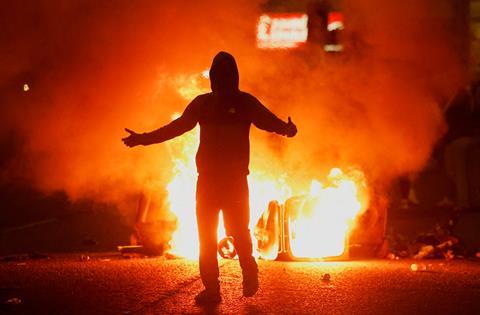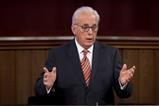With so much tragedy and unrest dominating our news headlines, it can be tempting to turn away or become disheartened. But in a world where conflict drowns out compassion, we need peacemakers more than ever, says Dr Krish Kandiah

Rafah. Los Angeles. Ballymena. We are living in a time of profound instability. Fear is manipulated for power; hunger is used as a tool of control and the voice of solidarity is stifled. As fractures and divisions deepen, the world aches under the weight of injustice and uncertainty.
From the desperate streets of Gaza to the tensions bubbling over in Northern Ireland and the militarised clampdown of protesters in the US, it feels as though hard-won peace is disintegrating before our eyes. If you’re like me, you’re feeling not only sadness but helplessness too.
Into this moment, the words of Jesus - spoken in similarly volatile times - land with both beauty and scandal: “Blessed are the peacemakers, for they shall be called children of God” (Matthew 5:9).
These words are not sentimental. They are subversive. In a world where conflict drowns out compassion, we need peacemakers more than ever - those willing to bridge divides and break down barriers, to listen deeply and reach out with courage and generosity.
Peace, not prejudice
Each flashpoint this week - riots sparked by ethnic tensions in Northern Ireland, suppression of protest in California and the deadly manipulation of aid in Gaza - highlights a painful truth. Wherever there is prejudice, peace is always fragile.
In Ballymena, the spark for unrest was an alleged crime involving two teenage boys from migrant backgrounds. But what followed was not a careful pursuit of justice but a racially charged backlash. This was not just a political failure, it was a spiritual one. When fear of the ‘other’ - xenophobia - overtakes compassion for our neighbour, we betray the heart of the gospel.
In times of division, intentional Christian hospitality and peacemaking become radical, prophetic acts
While in Northern Ireland some are driving out their migrant neighbours, in the United States, others are protesting mass deportation raids. A leaked memo authorising military force not in response to violence, but in anticipation of peaceful protests, should alarm every freedom-loving person. It marks a chilling shift from policing behaviour to policing intent. And when the voices being suppressed are overwhelmingly related to advocacy for the Palestinian people, it’s hard to escape the feeling that some voices are being systematically silenced.
And then there is Gaza. This week we saw not merely a tragedy, but something that looked horrifically like a tactic. Aid withheld. Starving people drawn in and then fired upon. It is too much to bear.
But bear it we must. Because if we look away and disengage, we cede the ground of compassion to the forces of violence.
Prejudice needs to be challenged. As Christians, our calling is not to be careless with our attitudes but to care more. Reconciliation begins by us choosing to see the humanity of the teenage boys in Ballymena - whatever the allegations against them. It begins by choosing to listen to the concerns of those crying out in protest on US campuses; by choosing not to turn away from the desperation of fathers and mothers in Gaza who risk their lives just to feed their children.
Peace not pretence
Most of us are fortunate enough to watch the unrest from a distance. We are not the ones fleeing airstrikes, deportation vans or racist mobs. But we cannot pretend that violence and injustice won’t eventually affect us too. By the time it does, it may be too late to act.
What if we acted now? What if our homes and communities became places where migrant families felt not just tolerated but genuinely welcomed. What if our churches were places where fear was dismantled and trust was rebuilt? What if Christians resisted hostility with hospitality - not just a plateful of food but shared stories, common goals and friendships that cross the lines drawn by suspicion and fear?
Wherever there is prejudice, peace is always fragile
What if churches joined their voices with those defending freedom of speech? Not because we agree with every chant or placard but because we believe that truth flourishes best in freedom, not fear. What if we reject the lie that justice and mercy are opposites? After all, they are held together in the character of God, and we can reflect that in our cries for justice and our acts of compassion.
What if we wrote to our MPs, our councillors and those in power when we see injustice wherever it occurs? They need to hear that ordinary people have not grown numb. That we are still watching. That we still care.
In times of division, these forms of intentional Christian hospitality and peacemaking become radical, prophetic acts.
Peace not passivity
Peacemaking is not the same as peacekeeping. Peacekeeping simply maintains the status quo. It avoids conflict. Peacemaking is active, disruptive and transformative. It challenges systems that crush the poor. It rebukes narratives that dehumanise migrants, and it refuses to accept militarisation as a default response to dissent. Peacemakers step into conflict, not to dominate, but to bring healing through non-violence, truth and compassion.
The Church must not be a chaplain to empire. We are called to be an alternative society - a preview of the coming kingdom of God. A kingdom where every tear is wiped away (Revelation 21:4), where swords are beaten into ploughshares (Micah 4:3) and where justice and peace kiss (Psalm 85:10).
This week, as I have watched the news footage from our broken cities around the world, I have been reminded of Isaiah’s vision of a people who “will rebuild the ancient ruins and restore the places long devastated” (Isaiah 61:4). That’s not a political strategy. It’s a vocation.
It’s time for the Church to reclaim it. So let us grieve. Let us rage at injustice. But let us actively, determinedly and compassionately seek peace at all costs, just as Jesus did.





































No comments yet